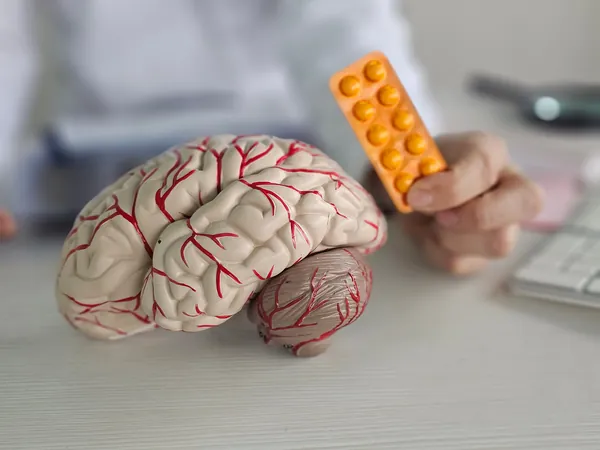
Alarming Link Found Between Early Onset Active IBD and Increased Psychiatric Issues and Medication Use!
2025-01-12
Author: Li
Groundbreaking Study by Crohn’s & Colitis 360
A groundbreaking study published in *Crohn’s & Colitis 360* has revealed a striking correlation between early onset inflammatory bowel disease (IBD) activity after diagnosis and a significant rise in psychiatric disorders alongside increased psychotropic medication use. This crucial research highlights the urgent need to address mental health in IBD patients, particularly those with active disease.
The Challenge of Co-Morbidities
Patients suffering from IBD often face additional health challenges, and those with psychiatric disorders suffer disproportionately. Studies show that IBD patients with concurrent psychiatric conditions experience greatly increased utilization of healthcare services, including hospitalizations and surgeries. This concerning trend underscores the complex interplay between physical and mental health, which researchers are eager to understand.
Research Methodology
The researchers conducted a comprehensive retrospective cohort study using the expansive TriNetX Research Network database, which aggregates data from over 113 million patients across 80 health care organizations. They focused on adult patients newly diagnosed with IBD since January 2023 and tracked those who had documented use of a range of IBD-specific medications.
Patient Group Classification
To delve deeper into their findings, the researchers divided the patients into two main groups based on IBD disease activity observed six to twelve months after diagnosis: those with active IBD and those without. Active IBD was identified through the use of steroid treatments and elevated levels of fecal calprotectin, a marker for inflammation.
Study Findings
From a total of 69,105 patients diagnosed with IBD between 2013 and 2023, researchers identified 16,961 individuals facing disease exacerbation within a year. Propensity score matching was used to compare the outcomes of 16,922 patients with active IBD against those without exacerbation. The results were staggering: those with active IBD reported significantly higher instances of various psychiatric disorders, including major depressive disorder (12.2% versus 5.7%), anxiety disorders (15.3% versus 7.2%), and even problematic alcohol use (3.5% versus 1.2%).
Substance Use and Medication Rates
The implications are dire—active IBD patients were found to be four times more likely to develop substance use disorders compared to their non-active counterparts. Additionally, the study revealed that these individuals frequently required psychotropic medication. For instance, 22.8% of active IBD patients were prescribed antidepressants compared to just 9.5% of those without active disease. Similarly, rates of antipsychotic and anxiolytic medications were markedly higher among those experiencing active IBD symptoms.
Recommendations for Mental Health Screening
The authors of the study advocated for preemptive mental health evaluations, emphasizing the significance of early screening for psychiatric comorbidities, particularly in patients confronting active disease. They cautioned that ignoring the psychological aspects of IBD could lead to a vicious cycle of worsening symptoms and exacerbated mental health struggles.
Study Limitations
Despite its valuable insights, the research acknowledges limitations such as potential underreporting of psychiatric disorders due to healthcare providers not part of the TriNetX network, reinforcing the need for continuous data collection and research in this area.
Conclusion
In conclusion, the findings call attention to the vital intersection between gastrointestinal and mental health in IBD patients. As the medical community seeks to provide comprehensive care, it becomes clearer than ever that addressing mental health should be an integral part of managing inflammatory bowel disease. More research is desperately needed to establish optimal screening methods and understand the implications of IBD disease activity on the mental well-being of patients.
Stay Tuned
Stay tuned for more updates on this critical health issue!
 Brasil (PT)
Brasil (PT)
 Canada (EN)
Canada (EN)
 Chile (ES)
Chile (ES)
 Česko (CS)
Česko (CS)
 대한민국 (KO)
대한민국 (KO)
 España (ES)
España (ES)
 France (FR)
France (FR)
 Hong Kong (EN)
Hong Kong (EN)
 Italia (IT)
Italia (IT)
 日本 (JA)
日本 (JA)
 Magyarország (HU)
Magyarország (HU)
 Norge (NO)
Norge (NO)
 Polska (PL)
Polska (PL)
 Schweiz (DE)
Schweiz (DE)
 Singapore (EN)
Singapore (EN)
 Sverige (SV)
Sverige (SV)
 Suomi (FI)
Suomi (FI)
 Türkiye (TR)
Türkiye (TR)
 الإمارات العربية المتحدة (AR)
الإمارات العربية المتحدة (AR)